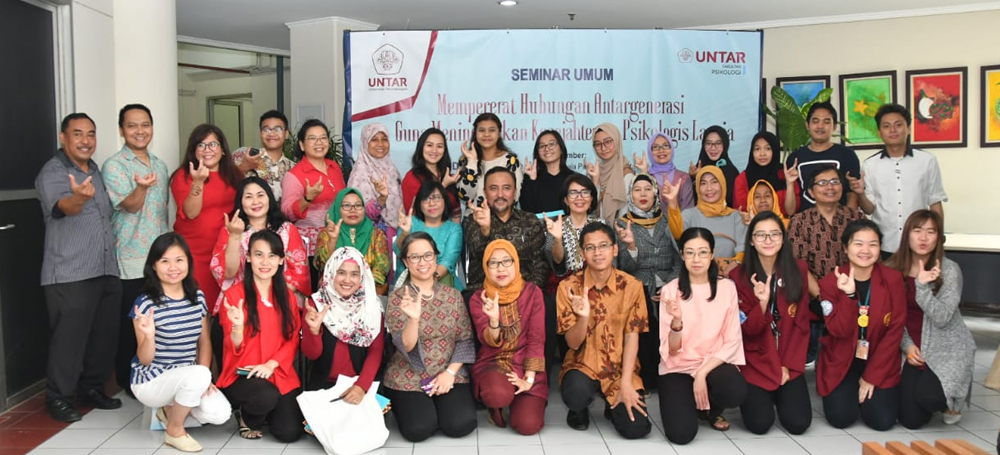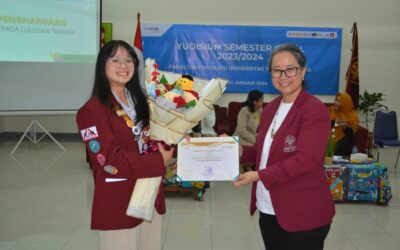Master of Psychology Science Study Program
Applying the Principles of Psychology to Serve and Empower People

Fields of Expertise
∎Industrial/Organizational Psychology
∎Educational Psychology
∎Family Psychology
Career Path
1. Human Resources Practitioner
2. Lecturer/Academician
3. Educational Counselor
4. Marriage Counselor
5. Professional Coach
6. Teacher/Principal
7. Learning Development Manager
Master of Psychology Science is Excellent-accredited and can be completed within 3 semesters, with excellence in Industrial or Organizational Psychology, Educational Psychology, and Family Psychology.
The design of learning curriculum is to produce reliable and professional graduates based on the values of Entrepreneurship, Professionalism, Integrity, and Caring Community (EPIC).
Learning is supported by complete infrastructures, business experts and professionals, Focus Group Discussions (FGD), sharing sessions and field studies in industry and business. Recognition of Prior Learnings, by course, and by research application programs are also available.

Featured Courses
| Course | Description | |
|---|---|---|
| Applied Psychological Theories in Educational Settings | In this course, students will learn the definition of theory and expected to be able to explain phenomena related to education with one of the theories that have been studied. Then, students will be taught to apply theories regarding motivation and self-regulated learning, in the context of educational problems in Indonesia. Students will write educational papers that analyze problems in everyday life in educational settings. Topics studied are: (a) Piaget and Neo-Piagetian Stage of Cognitive Development Theories; (b) Freud and Erickson's Psychoanalytic Theories; (c) Vygotsky and Socio-cultural Approaches; (d) Social Learning Theory; Information Processing Theory; (e) other Ethology and Evolutionary Theories; (f) Gibson's Ecological Theory of perceptual development; (g) Contemporary Mini Theories and emerging approaches; (h) others topics are about language shape thinking; (i) exercise of personal and collective efficacy in changing societies; (j) impact of family processes on control beliefs; (k) self-efficacy and educational development; (l) motivation and self-regulation, self-theories motivate self-regulated learning, self-regulation of achievement goal pursuit, interest and self-regulation; (m) motivational role of self-efficacy beliefs in self-regulated learning; (n) promoting self-regulated learning, a motivational analysis; (o) Self-Determination Theory perspective; (p) the motivational roles of cultural differences and cultural identity in self-regulated learning. | |
| Applied Psychological Theories in HR Management | In this course, students will learn to understand industrial/organizational phenomena (turnover/commitment, organizational learning, work engagement, performance, negative work behavior, etc.) at the individual, group, and organizational levels, and apply psychological theories to explain industrial/organizational phenomena. Students will propose the development program based on the theories studied. The topics studied are (a) employee turnover: proximal withdrawal states and an expanded criterion; (b) turnover rates and organizational performance; (c) organizational learning and learning organizations; (d) work engagement among employees, emotional demands; (e) recovery process and work engagement; (f) hierarchical representations of the five-factor model of personality in predicting job performance; (g) three organizing frameworks; (h) the process of work-family conflict and enrichment; (i) person-group fit on the need for cognitive closure; (j) group identification, cognitive basis for corruption and attitudes towards corruption in organizations; (k) lost sleep and cyberloafing; (l) leader sensitivity, emotion and counterproductive work behavior; and (m) current issues in organization. | |
| Applied Psychological Theories in Family | This course aims to enable students to understand the specialized field of family psychology, both scientific history, professional fields related to family psychology, psychological dynamics, various challenges and conflicts in the family, and family resilience. The course Application of Psychological Theory in the Family is given in the form of lectures, discussions, and group assignments so that students understand the concepts given. Lectures are conducted online as well as by giving assignments and group discussions. In this course, students will learn definitions, theories, how to explain phenomena related to family psychology and are able to apply theories, in the context of family psychology problems in Indonesia, which is shown by writing family psychology papers that analyze problems. Some of the knowledge and understanding expected to be achieved in this course are: (a) introduction to the specificity of family psychology; (b) Thoburn and Sexton's theory; (c) Family as a unique system; (d) conflicts, changes and challenges that occur in families based on available theories; (e) scientific foundations and methodologies used in researching family psychology; (f) various concepts and psychological measurement tools used in researching family psychology; (g) exploration of journals related to outgoing psychology | |
| Publication & Community Engagement | The objectives of this course: (a) students are able to write down the results of their research and publish their scientific work at least in national journals, preferably accredited national scientific journals; and (b) students are able to plan, implement, and evaluate community service programs based on research or scientific work they have made. This course will also discuss materials regarding (a) an overview of publication and community service policies in Indonesia; (b) concepts related to scientific publications, such as Scimago Journal Rank, H-Index, and Scopus; (c) methods in planning, implementing, and evaluating scientific publications; (d) concepts related to community service; (e) methods in planning, implementing, evaluating, and writing community service reports. With this course, students are expected to have adequate knowledge and understanding of (a) Humans as individuals and part of the system; (b) concepts, constructs, methods, theories, and practices of psychology related to functions and changes in human behavior throughout life from biological, psychological, social and spiritual perspectives; and (c) both general and specific. | |
| Applied Positive Psychology | By following this course, students are expected to be able to understand cases experienced by individuals based on the positive psychology concept approach; able to implement virtues/values in certain domains of life (family, education, industry/organization, social/clinical). Furthermore, by following this course, students learn to improve their skills in psychological assessment and intervention. In the psychological assessment stage, students are able to identify, describe, and test the social function, occupational function, or other functions of individuals, based on their influence or strength function. In the psychological intervention stage, students are expected to be able to know various ways or methods/strategies to develop or improve positive psychological aspects of individuals, so that individuals can try to create their own balance that optimizes social functions, job functions, or other functions. |
Facilities
News & Achievements
Registration for Untar Psychology Professional Has Opened
Psychology Professional Education Study Program of Untar is here to prepare experts who are able to bring positive changes in society. Through the application of the values of Entrepreneurship, Professionalism, Integrity, and Caring Community (EPIC), students are...
Present at Untar, South Korean Professor Emphasizes Culture of Care and Collaboration as Key to Change
Untar's Faculty of Psychology (FPsi) held an international seminar themed "Human Resource Management and Organizational Change in SDGs Disruptive Era" at the Auditorium of Untar Campus I, Friday (1/3). This seminar was held in the framework of international...
Students Need to Mastery Academic and Non-Academic Skills
Untar's Faculty of Psychology (FPsi) held an odd semester graduation ceremony for the 2023/2024 academic year at Untar Campus I, Wednesday (24/1). The best academic graduate student, Renata Verla Gunjaya, advised that it is important for students to master both...
Creativity Measurement Tool Delivers Untar Team to Win PIMNAS 2023
The Contextual Creativity Verbal Test (CVCT) team consisting of students from the Faculty of Psychology (FPsi) Untar class of 2020 won the National Student Scientific Week (PIMNAS) 2023. This activity was held on November 26-30, 2023 at Universitas Padjadjaran,...
Caring for Adolescent Mental Health, Psychology Students Hold Free Seminar
Students of Untar's Faculty of Psychology organized a seminar "Gembira: Young Generation Dares to Overcome Anxiety" at Auditorium Campus I Untar, Wednesday (22/11). This event was in collaboration with several high schools in Jakarta, including IPEKA Christian School,...
Untar Supports the Establishment of APRSI to Meet the Need for Psychologists in Hospitals
The Indonesian Psychological Association (HIMPSI) as the parent organization of the psychology profession in Indonesia welcomes the Declaration of the Indonesian Hospital Psychologists Association (APRSI) as the 21st association within HIMPSI. This was conveyed by the...






